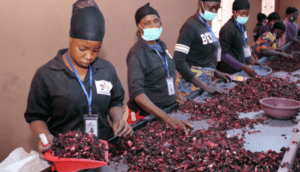By Prof. Raphael Nyarkotey OBU
Hibiscus, locally known as “sobolo” in Ghana, holds immense potential to generate significant revenue for the country due to its versatility and growing demand both locally and internationally. Here’s why:
- High international demand
- The global hibiscus market has been expanding steadily, valued at US$113.2million in 2021, with an expected CAGR (Compound Annual Growth Rate) of 7.2 percent from 2021 to 2028.
- Countries like Germany, the USA and Mexico are among the largest importers of hibiscus, particularly the dried flowers used for beverages like tea and syrup. For example, Mexico imports over 15,000 tonnes annually, while the USA continues to increase its reliance on hibiscus for herbal teas due to its health benefits.
Market growth from 2020 to 2025, and 2028 projections
- 2020: The global hibiscus flower powder market was valued at approximately US$113.3million (Grand View Research).
- 2021: The market size grew to around US$119.4million (Grand View Research).
- 2022: The market reached an estimated value of US$144.45million (Market Research USA).
- 2023: The market size was around US$123.7million (Market.us).
- 2024: Projected growth to US$197million (Grand View Research).
- 2025: The hibiscus extract market is expected to reach US$193.31million (Mordor Intelligence).
- Projections for 2028: The hibiscus flower powder market is anticipated to reach US$211.7million by 2028 (Polaris).
Key drivers of market growth
- Health and wellness trends: Growing consumer awareness of the health benefits of hibiscus, such as its antioxidant properties and potential to lower blood pressure, continues to drive demand for hibiscus-based products like teas, supplements and skincare items (Global Market Insights Inc).
- Culinary applications: Hibiscus is gaining popularity in the food and beverage industry for its refreshing flavour, vibrant colour and health benefits. It has been used in teas, beverages, jams and smoothies.
Regional insights
- North America: In 2022, North America led the hibiscus flower powder market, driven by strong demand from the food and beverage sector, along with pharmaceutical and personal care applications (Market Research USA).
- Europe: Germany imported 7 shipments of hibiscus flowers between July 2022 and June 2023, marking a 75 percent growth compared to the previous year (Market Research USA).
- Latin America: Mexico imported 124 shipments of hibiscus between March 2023 and February 2024, showing a 27 percent growth compared to the previous year (Market Research USA).

- Value-added products
- By processing hibiscus locally, Ghana can shift from exporting raw dried flowers to high-value products like hibiscus tea, powders, syrups and cosmetics.
- For instance, hibiscus tea is a major product in Europe and North America, with retail prices ranging from US$10–US$30 per kilogram, compared to raw hibiscus which sells for around US$3–US$5 per kilogram in the international market.
- In the cosmetics industry, hibiscus is known as the “botox plant” for its anti-aging properties. The global natural skincare market, which includes products using hibiscus extracts, was valued at US$6.7billion in 2021 and is projected to grow rapidly.
- Establishing local processing plants can significantly boost revenue and create opportunities for SMEs to market branded products.
- Job creation
- Hibiscus farming and processing can create jobs across the value chain. For every 10 hectares of hibiscus cultivated, it is estimated that 20–30 jobs are created for planting, harvesting, drying and processing.
- In Nigeria, hibiscus production employs over 200,000 farmers and contributes significantly to rural development. Ghana can replicate this model and reduce rural unemployment by promoting hibiscus farming as a key cash crop.
- Supports small-scale farmers
- Hibiscus is an ideal crop for small-scale farmers due to its low production costs. It requires minimal fertiliser and thrives in Ghana’s climate with seasonal rainfall. A farmer can produce an average of 2–3 tonnes of dried hibiscus per hectare, earning about US$6,000–US$9,000 annually from exports.
- In 2020, Nigeria exported over 20,000 tonnes of hibiscus worth US$35million, most of which was produced by small-scale farmers. Ghana can follow suit by investing in farmer training and input supply programmes.
- Boosts agro-processing
- Ghana’s agro-processing sector has been identified as a key driver of economic growth. The government’s One District, One Factory (1D1F) initiative can be leveraged to establish hibiscus processing plants.
- Agro-processing can significantly increase the value of hibiscus exports. For example, in Kenya, hibiscus tea companies export processed tea at 3–5 times the value of raw flowers, creating more foreign exchange earnings.
- Establishing regional hubs for drying, grinding and packaging hibiscus can also reduce post-harvest losses, which are estimated to be 20–40 percent of crops in Ghana annually.
- Health and wellness market
- Hibiscus is rich in antioxidants, lowers blood pressure and has anti-inflammatory properties. With the global shift toward natural and organic products, the health and wellness market was valued at US$4.37trillion in 2020, and herbal teas like hibiscus are growing in popularity.
- Studies show that hibiscus tea can reduce systolic blood pressure by 7.5 mmHg on average, making it a preferred alternative for health-conscious consumers. This can be a key selling point in marketing Ghana’s hibiscus products.
- Ghana can capitalise on this trend by branding hibiscus products as organic and promoting them to international health-conscious consumers.
- Tourism and local consumption
- Locally, “sobolo” (hibiscus juice) is already a popular drink, but production remains mostly informal. Ghana can formalise this market by investing in hygienic production, packaging and marketing.
- The tourism sector provides a ready market for hibiscus-based beverages. Ghana’s tourism earnings reached US$2.1billion in 2019, and high-quality local beverages like hibiscus tea or juice can enhance the tourist experience while creating additional revenue streams.
- Hibiscus-based products can also be marketed in supermarkets, hotels and restaurants, generating consistent domestic revenue.
- Export opportunities under AfCFTA
- The African Continental Free Trade Area (AfCFTA) provides a platform for Ghana to export hibiscus and its derivatives to 53 other African countries with reduced tariffs and trade barriers.
- For example, Ghana could export hibiscus tea to Nigeria, which imports large quantities of herbal teas; or to East African countries where hibiscus is used for medicinal purposes. Intra-African trade is projected to increase by 52.3 percent under AfCFTA, and hibiscus can play a key role in Ghana’s trade strategy.
- Climate resilience
- Hibiscus is drought-tolerant and requires minimal inputs, making it an excellent crop for regions prone to climate change. In Ghana, the savanna and semi-arid regions – which face challenges with maize and other traditional crops – can benefit from hibiscus farming.
- Studies in Sudan have shown that hibiscus yields remain high even under 50 percent reduced rainfall, indicating its potential to support sustainable agriculture in Ghana’s northern regions.
- Government support and policies
- Government investment in hibiscus could mirror successful models like Nigeria, which has positioned hibiscus as one of its leading non-oil export commodities.
- Ghana’s Planting for Food and Jobs programme could include hibiscus as a priority crop, providing subsidies for seeds, fertilisers and irrigation systems.
- Additionally, setting up an export promotion strategy for hibiscus can attract foreign exchange. For instance, the Ghana Export Promotion Authority (GEPA) could add hibiscus to its priority list of non-traditional exports, aiming to increase non-traditional export revenue, which stood at US$3.3billion in 2021.

Implications for Ghana
- Ghana is well-positioned to capitalise on the growing global demand for hibiscus due to its favourable climate for cultivation. Its proximity to key export markets like the USA, Germany and Mexico makes it an ideal supplier in the hibiscus market.
In conclusion, the hibiscus market has shown strong growth from 2020 to 2025, with positive projections for the coming years. Ghana’s favourable conditions offer a strategic opportunity to tap into this expanding market and become a significant player in the global hibiscus trade.
>>>The author is a Professor of Naturopathy, a Gambia-trained Lawyer, and a Chartered Health Economist. e-mail: [email protected]










